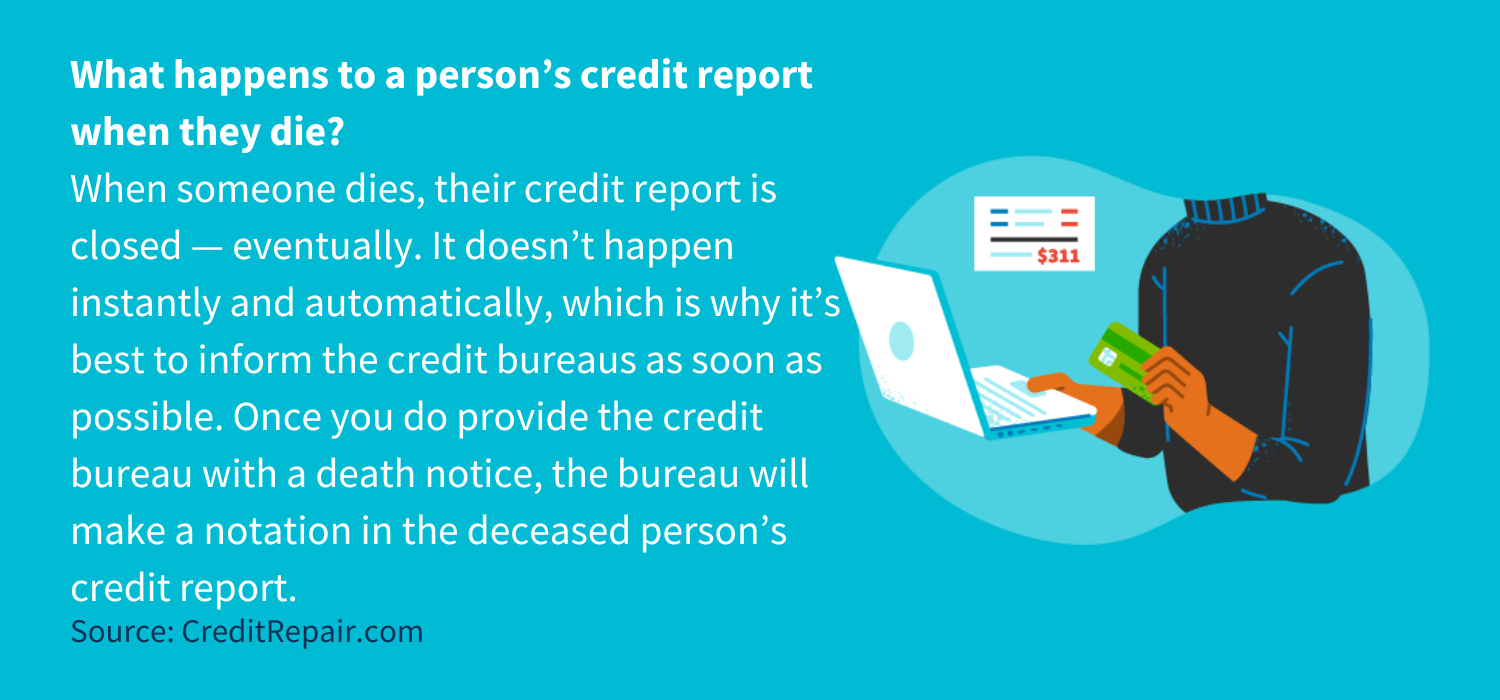How to report a relative’s death to the credit bureaus



credit bureaus. The regrettable truth, nevertheless, is that a deceased individual's debts and liabilities need to be resolved as quickly as they can be. Failing to do so can cause monetary headaches for beneficiaries and the estate of the departed, with financial institutions attempting to collect the deceased individual's financial obligations and triggering you tension throughout a time when you do not want to be thinking about such matters. What follows are responses to some of the most typical questions about what happens to financial obligation when a member of the family dies and why you ought to report deaths to credit bureaus to avoid any credit issues.
What happens to a person's credit report when they die?

When somebody dies, their credit report is closed– eventually. It doesn't take place quickly and immediately, which is why it's best to notify the credit bureaus as quickly as possible.
Once you do supply the credit bureau with a death notification, the bureau will make a notation in the departed person's credit report.
While this does not instantly close their credit report, it decreases the chance of the deceased's identity being stolen. Flagging that the person is deceased will stop an identity burglar from fraudulently opening a new credit line in the deceased person's name.
After 7 years of being flagged due to death and all accounts being settled, the credit report will be closed for great. It will then be deleted totally by the credit bureaus and will no longer exist.
How do the credit bureaus learn about an individual's death?
There are a few various ways for the three credit bureaus (TransUnion ®, Experian ® and Equifax ® )to discover that somebody has passed away:
- By the deceased individual's lenders. After a death, the estate's administrator or a relative of the departed informs several lenders– for instance, a credit card provider or an auto loan provider that had been used by the deceased– to notify them of the death. When the loan provider updates the account keeping in mind the death, the death will get reported to several of the credit bureaus. Via the Social Security Administration (SSA). The SSA consistently alerts the 3 credit bureaus about deaths. To do that, naturally, the SSA itself requires to have been alerted about the death. This is typically done by the funeral home. Additionally, the deceased individual would need to have been getting Social Security advantages for the SSA to inform the credit bureaus.
- From the administrator or a relative. Notifying a credit bureau straight that someone has passed away is the most surefire way to make certain the credit bureaus update their credit reports in a prompt fashion. It's faster and more reputable than the other ways discussed above.
How you report a death to the credit bureaus
To report a death to the credit bureaus, you need to get in touch with among them and offer a death certificate. This can be done online or through the mail.
While you can notify all three credit bureaus, it's truly just necessary to inform among them; when one credit bureau is notified, that bureau will inform the other two. Here are the actions you require to take to report at death to the credit bureaus:
1. Make certain the Social Security Administration has upgraded its files
While funeral homes frequently do the job of reporting the death to the Social Security Administration, you might also want to call the SSA straight to ensure the details was transferred appropriately. This can't be done online; you must call the SSA.
In addition to making sure the SSA reports the death to the credit bureaus, calling the SSA can provide you an opportunity to go over getting any death benefits (if eligible).
2. Get the death certificate
The credit bureau will need a death certificate as proof that someone has died, so this action should be done as quickly as possible.
Depending on your state and locality, the process for getting a death certificate will vary. The file might be released from a city clerk, records department or courthouse. Examining the site of or calling the Department of Health in the state where the person died is a good location to begin.
3. Ask for a credit freeze from the credit bureaus
Getting in touch with each credit bureau to ask for a credit freeze will flag the account and avoid brand-new lines of credit from being opened by identity burglars. It can be done online or over the phone.
If you decide to do it over the phone, it's a great idea to ask any questions you may have about the more official step of notifying the credit bureau of the death.
Here's how to get in touch with each credit bureau online to request the credit freeze:
4. Send in a copy of the death certificate to one of the credit bureaus
Once you've gotten the death certificate, send a copy to one of the bureaus. Experian is the just one of the 3 credit bureaus that allows you to finish the process online instead of via the mail.
In addition to sending the death certificate, including the following information about the deceased:
- Legal name
- Social Security number
- Date of birth
- Date of death



